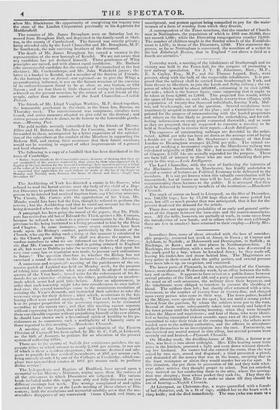The Archbishop of York has directed a curate in his
diocese, who refused to read the burial-service over the body of the child of a Bap- tist Dissenter to perform the service in future, in all cases where the person to be interred had received baptism from any Christian minister. The Curate, Mr. Carter, with the approbation of his Vicar, Mr. Maude, would fain have had the fees, though he refused to perform the service ; but the Archbishop said that he could not account for the fees being demanded where the duty had not been performed. A paragraph has been going the round of the papers, that Dr. Mill- pots has revived an old law of Edward the Third, against a Mr. Comyns, because he refused to submit to a private examination by the Bishop, previous to his being instituted to a living presented to him by the Dean and Chapter. In some instances, some severe strictures have been made upon the Bishop's conduct, particularly by the friends of the Church, who say the doing such a thing it this imminent is calculated to do the Church great injury. We shall not discuss the matter, but confine ourselves to what we are informed are the facts of the ease,— viz, that Mr. Comyns never succeeded in getting ordained in England at all, but went to Dublin to take the necessary orders ; that upon his very case some law or regulation was made, to prevent such ordinations in future ! The question therefore is, whether the Bishop has not exercised a sound discretion in this instance ?—Dems4hire Advertiser.
A numerous and respectsble meeting of the parishioners of the ex- tensive parish of Leyland was held on Monday week, for the purpose of taking into consideration what steps should be adopted in conse- quence of the Vicar Levis.. issued writs for the enforcement of his de- mands for an extensive ad,lition to his tithes, particulaily on meadow- lands which never had paid tithe before. After an adjournment, in order that each township might take into consideration its own indivi- dual case, the several townships eame to the unanimous resolution of resisting the Vicar's demands, and instrueted their solicitor to take the necessary steps for their defence ; after which, resolutions to the fol- lowing effect were carried unanimously " That each township should bsar its proper proportion of the necessary expenses, to be estimated according to the county-rate ; and that this meeting cannot separate without expressing its regret, that whilst their Vicar might have spared them considerable expense without prejudicing himself or his 11CW claims, he should have shown such a determined spirit of hostility to his pa- rishioners as to commence such a multiplicity of Chancery suits as those reported to this meeting."—.1tanchester Chronicle.
A meeting of the landowners and agriculturists of the Eastern Division of Cornwall has been called, by Mr. G. C. Call, at Liskeard, on the 16th of January, to petition for an alteration of the present system of collecting tithes. There arc in the county of Suffolk five contiguous parishes, the ag- gregate tithes of which amount to nearly 2,500/. per annum, in not one of which is there a resident clergyman ; the income destined and ade- quate to provide for five resident incumbents, at 500/. per annum each, being entirely absorbed by one of the Colleges at Cambridge, which em- ploys two non-resident curates at 1001. per annum each, to perform divme service!
The Indepeudents and Baptists of Bradford, have agreed upon a memorial to his Majesty's Ministers, urging upon them the redress of all the grievances to which Dissenters are subjected. The various heads included under this topic were ably and fully discussed on two different evenings last week. The wrongs complained of and rights asserted are the same as at the Leeds meeting of those classes of Dis- senters; both the resolutions and memorial candidly- avow that the me- usorialists disapprove of any connexion veen Church end State, as unscriptural, and protest against being compelled to pay for the main- tenance of a form of worship from which they dissent.
A correspondent of the Times mentions, that the number of Church- men in Nottingham, the population of which in 1831 was 50,000, does not exceed 5,800; while the Dissenting congregations number 12,000. The number of children taught in the Sunday schca Is of the Establish- ment is 1,678; in those of the Dissenters, 5,048. This statement dis- proves, as far as Nottingham is concerned, the assertion of a writer in the last Edinburgh Review, that in England " not above a third or a fourth are sectaries."






















 Previous page
Previous page